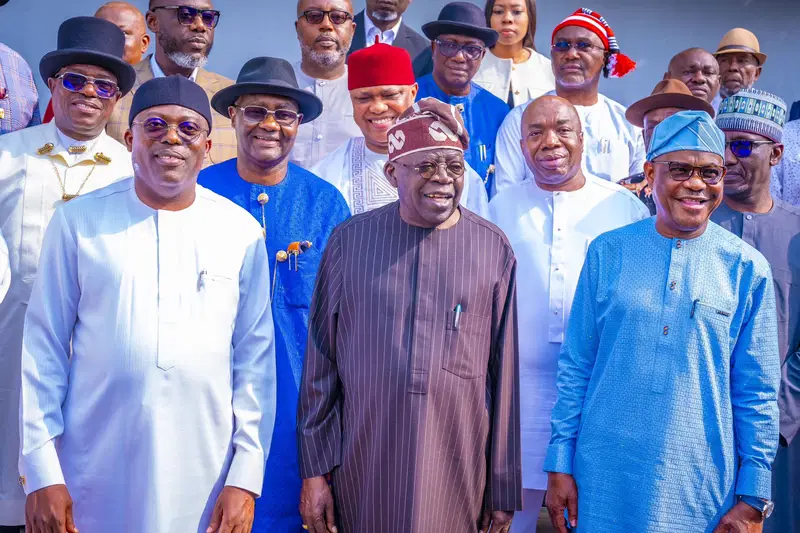Politics
Fubara reportedly plans to join APC amid Tinubu’s deal

In a development that could significantly alter the political dynamics ahead of the 2027 general elections, suspended Governor Siminalayi Fubara of Rivers State is reportedly on the verge of defecting to the All Progressives Congress (APC), following a prolonged period of political coercion and institutional pressure allegedly orchestrated by the federal government under President Bola Tinubu.
According to a report by SaharaReporters, the move marks the climax of a concerted effort by the ruling APC to secure strategic control of key states.
Insiders familiar with the situation describe the tactics employed against Governor Fubara as “unprecedented and deeply troubling,” suggesting a systematic campaign to strip him of political leverage.
According to the online newspaper, federal administration is said to have mobilized state machinery—including the judiciary, law enforcement agencies, and the National Assembly—in an effort to isolate and subdue Fubara politically.
READ ALSO:I may not return as Rivers gov – Fubara
At the center of the unfolding saga is Minister of the Federal Capital Territory (FCT), Nyesom Wike—once Fubara’s political mentor, now his chief rival. With the apparent support of the Presidency, Wike is believed to have led the charge against the embattled governor through various means, including legislative threats, court actions, and a rumored impeachment plan.
“The President wanted Rivers State under control by any means necessary,” one source disclosed. “The fear of 2027 is real. Their internal assessments showed that public discontent was growing over hardship, insecurity, and economic mismanagement. The only way out was to break the opposition and enforce loyalty, state by state.”
The federal government’s alleged refusal to address concerns raised by civil society and prominent citizens further reinforced suspicions of a calculated political offensive.
A critical turning point reportedly came during the so-called “2025 London Peace Accord”—a behind-the-scenes negotiation between Fubara and President Tinubu.
“It was during this meeting that Governor Fubara agreed to join the APC in exchange for political survival,” a source revealed.
Reports confirmed that Tinubu met with the suspended governor during an official trip to London in April. Although the Presidency has yet to publicly acknowledge the encounter, insiders believe it was the first direct meeting between both men since the political crisis in Rivers escalated.
As part of the arrangement, Fubara would regain his position—albeit with diminished autonomy—as power brokers within the APC would share or supervise control over the state’s key resources. Interestingly, Wike has since altered his public stance, now referring to Fubara as “his son” and denying any rift between them.
In an interview with BBC Pidgin, Wike denied fighting with the suspended Rivers State governor, saying, “Fubara is my son, why will I fight with him?
“I’m only fighting against people who want to steal what they did not work for.
“When you don’t defeat them, they will think you….. Defeat them to the final stage.
“Now, they are ashamed because they are being defeated. They are the ones pushing Fubara.”
According to the publication, Wike noted that he had told Fubara during a visit that he was ready for peace — if Fubara was ready as well.
“I told him that you have yam in your hand and the knife, you are the one that knows how you want peace. If you want sincere peace, you take, if you want dubious peace, you also take.”
Despite the outward appearance of reconciliation, many observers remain skeptical, interpreting Fubara’s decision as a concession made under duress.
“Fubara has been beaten into submission, and Rivers State has been turned into a pawn in the power game of Abuja,” one of the sources said.
“No governor has ever suffered such humiliation as Governor Fubara suffered in the history of Nigerian politics.”
The source lamented how Fubara, a governor, was “humiliated, tormented, and politically crushed” to force him into the ruling party.
No governor has been subjected to such abuse of power in Nigeria’s history,” the source said.
Recall that on March 18, 2025, President Tinubu invoked Section 305 of the 1999 Constitution (as amended) to declare a state of emergency in Rivers State, citing a breakdown of law and order and the failure of constitutional mechanisms to resolve the escalating political crisis in the state.
The declaration followed months of intense political turmoil between Fubara and his estranged political godfather, Wike.
The conflict, which began shortly after Fubara assumed office in May 2023, led to repeated attempts by a faction of the state House of Assembly to impeach the governor, violent protests, destruction of government property, and a governance vacuum in the state executive council.
Citing the state government’s inability to maintain public order and coordinate essential governance functions, President Tinubu also secured a controversial National Assembly approval for the emergency declaration as required by the Constitution.
He stated that the crisis in Rivers had become a national security concern with implications for democratic stability.
Following the proclamation, Governor Fubara and his deputy, Ngozi Odu, were suspended from office, along with key state officials, and the state’s executive and legislative functions were dissolved.
The President then appointed a sole administrator, retired Vice Admiral Ibok-Ete Ekwe Ibas, believed to be loyal to the Presidency, to take charge of governance in the state during the emergency period.
The move was widely condemned by opposition parties, civil society groups, and constitutional scholars, who argued that the declaration was politically motivated and violated democratic norms.
(SAHARA REPORTERS)





















